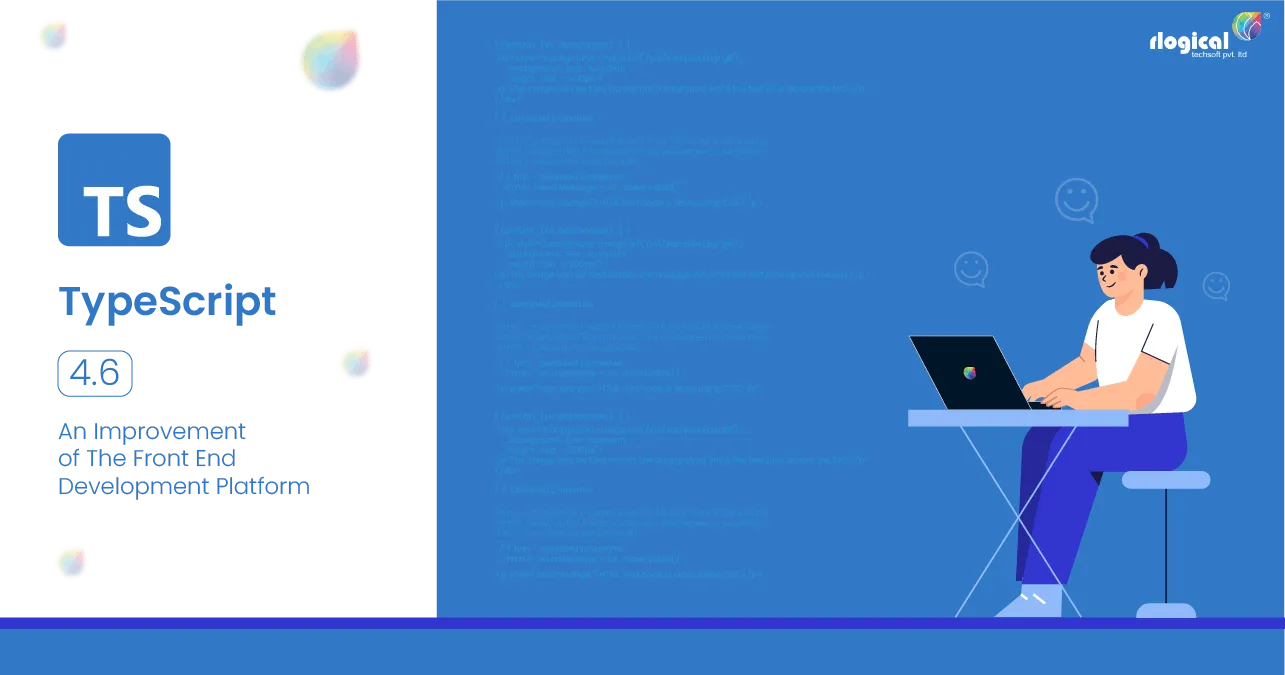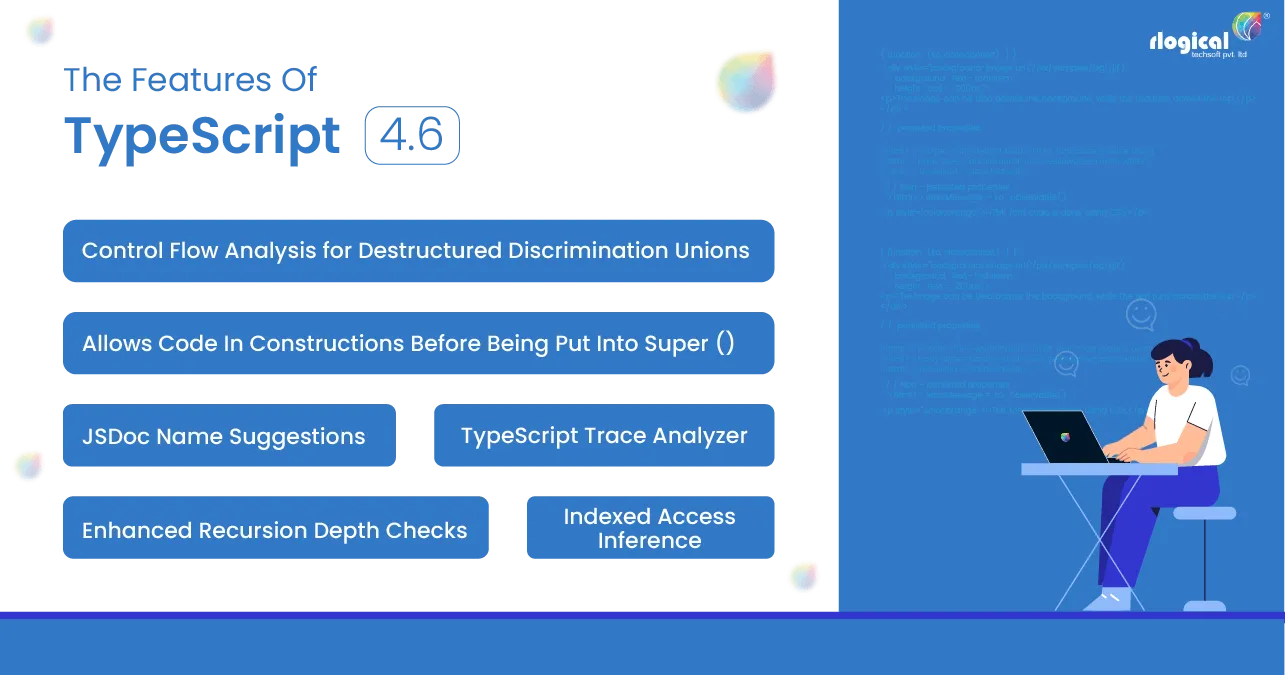
As a front-end development platform, TypeScript has achieved the tag of most adopted technology based on its annual growth graph. The TypeScript platform has been a dominant platform in front-end development. The most updated version of TypeScript was released on 28 January 2022, with the 4.6 version hitting the floors. With every new release, the TypeScript platform introduces new features for developers. In this article, we discuss the new features of the TypeScript Development platform. We understand how the new release of TypeScript will help developers in JavaScript development.
What is TypeScript?
TypeScript is a language that developed from JavaScript and adds typescript 4.6 syntax as type. Types help in categorizing the coding commands and coded functions. For a highly organized front end, the TypeScript platform is the best one. The segmentation of coding commands with the help of Types helps reduce coding errors, which does not translate into the display. The typeset reduces the chances of null and void coding sets and typo mistakes.
Overall, the use of the TypeScript platform helps in the accurate development of the front-end layout. The TypeScript creates web application services while saving time and money. Developers can create new applications with ease via a smooth process. Thus the development experience on the TypeScript platform is better than other front-end development frameworks. TypeScript 4.6 looks forward to heightening this experience.
The Features Of TypeScript 4.6
The TypeScript 4.6 version includes Control Flow Analysis for destructured discriminated unions. TypeScript 4.6 has feature narrowing types based on a discriminant party. Under the new version of TypeScript, the platform now supports ES2022, giving class fields a stable output target. On the other hand, many other features make TypeScript 4.6 a vital front-end development platform.

1. Control Flow Analysis for Destructured Discrimination Unions
This version of Control Flow Analysis will help narrow down the signature for a certain code and command. The feature allows the platform to narrow down the variables on each type and check the other variable to align them for a single framework. Control flow analysis helps analyze code types for better organization of variables. The control flow analysis makes the entire coding process and structures smooth for implementation.
2. Allows Code In Constructions Before Being Put Into Super ()
When developers work with JavaScript, they have to work with the Super () before using the “this” command. The TypeScript platform is no stranger to this. However, in TypeScript 4.6, the check feature has become very simplified. The feature allows any other code to run before the Super () set. The Super () set is last about the ‘This’ command. This change in the execution of () set at the top level allows the non this, non-super code to be implemented as a part of the constructor’s root level statements.
3. JSDoc Name Suggestions
The TypeScript Platform is smarter in its 4.6 version. The TypeScript 4.6 version can give name suggestions to replace any discrepancies between the function and JSDoc comment. The JSDoc feature allows developers to document parameters with the help of the ‘Param’ tag. However, when the developer wants to change the parameters name or when the comments are going out of date, you need a type checking function on the TypeScript 4.6 platform. You can do the same with the help of the CheckJS function. The developer can also include the @ts-check comment at the top of the file. The Typescript 4.6 version links these information bits with the JavaScript Development Services editor sub-platform.
4. Enhanced Recursion Depth Checks
The Recursion Depth Check on the TypeScript platform has improved with the release of the 4.6 version. TypeScript has a structural coding flow and commands implemented step by step after checks. The recursion depth check in its enhanced version stops errors from taking over due to rapidly expanding types. The developer now does not have to spend a lot of time checking the code for type compatibility. The new version reduces excess error concerns arising from explicitly written code structure. The code checking time and effort for a JavaScript development professional reduce.
5. TypeScript Trace Analyzer
The TypeScript Trace Analyzer is a new version tool found on the Typescript 4.6 platform. The Analyser provides the coded information in a more readable format for the developer and tester. The readable information simplifies the checking process during code compilation allowing the developer to save time. Less time is spent on correcting the mistakes.
The developer easily identifies the computationally expensive code segments for optimization. On the other hand, the analyzer helps developers diagnose the basic issues in the compilation process before implementation. The code is easy to digest, which helps in better management and improvement at the end of the compilation.
6. Indexed Access Inference
Earlier versions of the TypeScript platform had a very complex process of indexing which gave rise to issues in accessing indexed access types. The present version of TypeScript resolves this issue to a great extent with the help of distributed object types. The present version allows easy access to indexed code types, quickly translating into a mapped object type.
Apart from these features that improve the coding process and time for the development of web application services, other features include the elimination of unnecessary arguments from the ReactJS library to reduce the size of the coded framework. The TypeScript 4.6 version can develop lightweight, simpler front-end systems for web applications. The JavaScript Syntac and binding errors in the compilation are also easily displayed via the new interface of the 4.6 version. The new version of Typescript 4.6 is a definite improvement over previous versions of the Javascript Development Platform.
Jatin Panchal
Jatin Panchal is the Founder & Managing Director at Rlogical Techsoft Pvt. Ltd. For more than a decade, he has been fostering the organization's growth in the IT horizons. He has always bestowed personalized approaches on .NET, PHP, Flutter, and Full-Stack web development projects. From startups to large enterprises, he has empowered them to accomplish business goals. By delivering successful industry-driven solutions, he is encouraging the capability of AI, ML, blockchain, and IoT into custom websites and hybrid mobile applications.
Related Blog
- A Guide on Progressive Web App with React: The Long-Term Solution for Business Growth
- Top JavaScript Frameworks For Your Web Applications Project
- Why Use VueJS? Most Popular Frontend Framework for Your Web Development
- Create Appealing Real-Time Applications with NodeJS: The JavaScript Edge for Apps
- Top Apps Built With Node.js: The Success Story of NodeJS
Categories
- All
- AI Development Services
- Amazon Web Services (AWS)
- ASP.Net Development
- Azure Web App
- Big Data Analytic
- Customize
- Digital Marketing
- Drupal Development
- E-commerce web development
- Education Mobile App Development
- Enterprise Application
- Event Management App Development
- Fintech
- Fitness App Development
- Food Delievery
- Front-End Development
- Grocery App Development
- Healthcare App Development
- Hire Dedicated Developers
- Hotel Booking App
- IT Industry
- JavaScript Development
- Mobile App Development
- On Demand App Development
- On Demand Healthcare App Development
- PHP Development
- POS Software Development
- Real Estate Mobile App Development
- Retail Business App Development
- Salesforce
- Social Media Development
- Software Development
- Technology
- Transportation App Development
- UI/UX Design
- Web Design
- Web Development
- Web Services
- Web/Data Scraping Services
- WordPress




 Jatin Panchal in JavaScript Development
Jatin Panchal in JavaScript Development 





